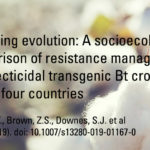
Governing evolution – A socioecological comparison of resistance management for Bt crops
Zachary Brown, March 21, 2019 | Cooperative management of pest susceptibility to transgenic Bacillus thuringiensis (Bt) crops is pursued worldwide in a variety of forms and to varying degrees of success depending on context. We examine this context using a comparative socioecological analysis of resistance management in Australia, Brazil, India, and the United States. We find that a shared understanding of resistance risks among government regulators, growers, and other actors is critical for effective governance. ...
Curating Art and Science: Art’s Work in the Age of Biotechnology
Hannah Star Rogers, March 25, 2019 | Resurrecting the Sublime is a synthetic biology based artwork which presents the scents of extinct plants, produced through a combination of techniques, materials, and ideas from art and biotechnology. This work will be installed as part of the Art's Work/Genetic Futures exhibit in the fall of 2019....Continue reading "Curating Art and Science: Art’s Work in the Age of Biotechnology"
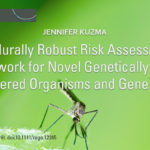
Procedurally Robust Risk Assessment Framework for Novel Genetically Engineered Organisms and Gene Drives
Jennifer Kuzma, March 8, 2019 | This article reviews the current state of gene-editing regulation for crops, illuminating the ways in which technology developers are repeating practices that may lead to the public and ethical failures of the first generation genetically engineered crops, and argues that the contentious socio-political history of genetic engineering will repeat itself for gene editing if these continue....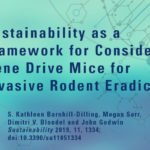
Sustainability as a Framework for Considering Gene Drive Mice for Invasive Rodent Eradication
March 4, 2019 | Sustainability as a Framework for Considering Gene Drive Mice for Invasive Rodent Eradication, by S. Kathleen Barnhill-Dilling, Megan Serr, Dimitri V. Blondel and John Godwin. Abstract: Gene drives represent a dynamic and controversial set of technologies with applications that range from mosquito control to the conservation of biological diversity on islands. Currently, gene drives are being developed in mice that may one day serve as an important tool for reducing invasive rodent pests, a key threat to island biodiversity and economies. ...
2018-19 University Faculty Scholars Named
NC State’s 2018-19 class of University Faculty Scholars was announced today. These 20 early- and mid-career faculty [including GES Center Executive Committee Member, Jason Delborne] receive this designation due to their significant academic achievements and contributions to NC State through their teaching, research and community engagement....Continue reading "2018-19 University Faculty Scholars Named"
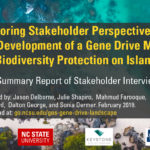
Report: Stakeholder Perspectives on Gene Drive Mice for Biodiversity Protection on Islands
Jason Delborne, February 20, 2019 | This article reviews the current state of gene-editing regulation for crops, illuminating the ways in which technology developers are repeating practices that may lead to the public and ethical failures of the first generation genetically engineered crops, and argues that the contentious socio-political history of genetic engineering will repeat itself for gene editing if these continue....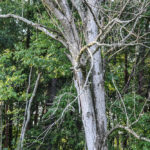
Can genetic engineering save disappearing forests?
Jason Delborne, January 18, 2019 | Forests in the US face many threats: climate change, invasive species, pests and pathogens. Could genetically engineering trees make these plants more resilient?" ...Continue reading "Can genetic engineering save disappearing forests?"

NASEM Sackler SciComm: The promise and perils of gene drives
In November of 2017, an interdisciplinary panel discussed the complexities of gene drive applications as part of the third Sackler Colloquium on “The Science of Science Communication.” This paper builds on the ideas and conversations from the session to provide a more nuanced discussion about the context surrounding responsible communication and decision-making for cases of post-normal science. Deciding to use gene drives to control and suppress pests will involve more than a technical assessment of the risks involved, and responsible decision-making regarding their use will require concerted efforts from multiple actors....Continue reading "NASEM Sackler SciComm: The promise and perils of gene drives"
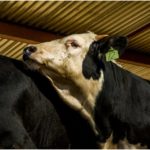
WP: Gene-edited farm animals are coming. Will we eat them?
“We’re at this inflection point in society, where gene editing is really taking off, and now is the time we could have a more sustained public conversation about how we want it used in our world and how we don’t want it to be used,” said Jennifer Kuzma, co-director of the Genetic Engineering and Society Center at North Carolina State University. “All the polls indicate that people are less comfortable with animal biotechnology than plant biotechnology... A regulatory system cannot be based 100 percent on science or scientific risk, and values come into play when setting the standards.”...Continue reading "WP: Gene-edited farm animals are coming. Will we eat them?"
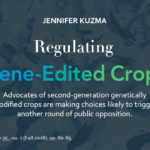
Issues: Regulating Gene-Edited Crops
This article reviews the current state of gene-editing regulation for crops, illuminating the ways in which technology developers are repeating practices that may lead to the public and ethical failures of the first generation genetically engineered crops, and argues that the contentious socio-political history of genetic engineering will repeat itself for gene editing if these continue....
Kudos to Kuzma: Distinguished Professor Named AAAS Fellow
Jennifer Kuzma has been elected as a fellow of the American Association for the Advancement of Science. Kuzma is the college’s Goodnight-North Carolina GlaxoSmithKline Foundation Distinguished Professor in Social Sciences and co-directs NC State’s Genetic Engineering and Society Center....Continue reading "Kudos to Kuzma: Distinguished Professor Named AAAS Fellow"

GES Center Co-director Jennifer Kuzma Named AAAS Fellow
Jennifer Kuzma, Goodnight-North Carolina GlaxoSmithKline Foundation Distinguished Professor in Social Sciences and co-director of the Genetic Engineering and Society Center at NC State, elected for distinguished translational work in bridging the bench and society, advancing anticipatory governance of new technologies, and contributions to methods for oversight policy analysis....Continue reading "GES Center Co-director Jennifer Kuzma Named AAAS Fellow"

4 NC State Faculty Named AAAS Fellows
The American Association for the Advancement of Science elects 416 fellows, including four from NC State. Meet our newest members of the prestigious organization....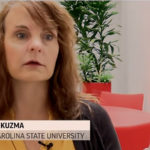
AP: Kuzma discusses need for case-by-case scrutiny of gene-edited foods
Per Kuzma, companies will have to be up-front about how these new foods were made and the evidence that they’re healthy. She wants regulators to decide case-by-case which changes are no big deal and which might need more scrutiny.“Most gene-edited plants and animals are probably going to be just fine to eat. But you’re only going to do yourself a disservice in the long run if you hide behind the terminology,” Kuzma said....Continue reading "AP: Kuzma discusses need for case-by-case scrutiny of gene-edited foods"
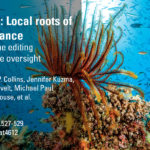
Editing nature: Local roots of global governance
Dr. Jennifer Kuzma, Goodnight-NC GSK Foundation Distinguished Professor and Co-director of the Genetic Engineering and Society Center, was one of the lead authors on an interdisciplinary team calling for global oversight of environmental gene editing in this Science Policy Forum, Editing Nature: Local roots of global governance....Continue reading "Editing nature: Local roots of global governance"